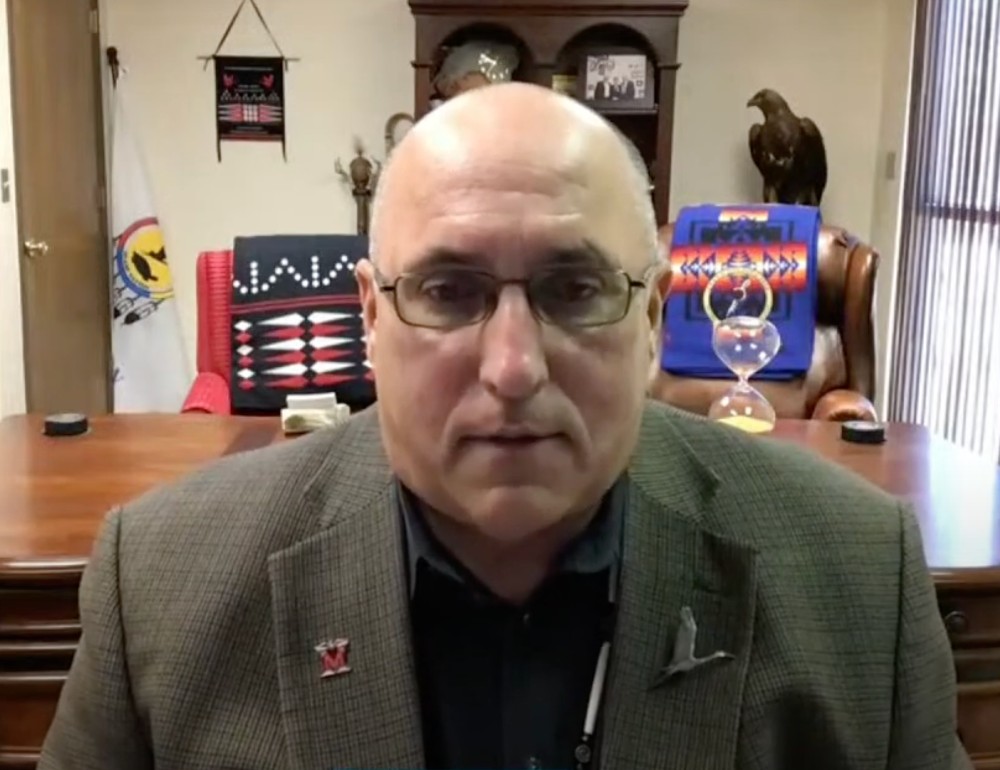
- Details
- By Tripp J Crouse - KNBA
Federal legislation in the U.S. House would extinguish a Tribe’s claim to land in Illinois.
The Miami Tribe of Oklahoma would remove any cloud on title to land – about 2 (point) 6 acres of farmland in eastern Illinois. In exchange, the Miami Tribe seeks a one-year window to bring its case to federal court -- to seek compensation for the lands’ transfer and sale without Tribal consultation or payment.
Douglas Lankford is chief of the Miami Tribe of Oklahoma. He spoke before the U.S. House Natural Resources Subcommittee on Indigenous People during a hearing on a number of related Tribal issues.
This story was originally published by KNBA. Republished by Native News Online with permission.
“All this bill grants to us is our day in court and we still have to prove our case,” Lankford said. “But the landowners in Illinois once it’s signed they receive immediate relief.”
Minnesota Democratic Representative Betty McCollum introduced House Resolution 6063 – for equitable settlement of certain Indian land disputes regarding land in Illinois.
The land was part of an 1805 treaty to the ancestral homelands of the Tribe – an area south of the Great Lakes and what are now the states of Illinois, Indiana and Ohio.
In 1805, the Tribe and historical constituents – The Eel River Band and Wea – signed the Treaty of Grouseland – which reserved lands in the Wabash River watershed -- a waterway which now serves as a partial border between Illinois and Indiana.
Over time the United States transferred or sold that land to non-Indians without negotiation or payment to the Miami Tribe.
The Eel River Miami became a part of the Miami Tribe of Oklahoma and the Wea ceded their interest in the reserved land in 1818.
Because the Tribes says the conveyance happened through treaty-recognized title – it says it’s entitled to compensation for the loss.
In exchange for the Tribe extinguishing the cloud on title it seeks a one-year window for the Tribe to bring its case before the United States Court of Federal Claims, but extinguishing the cloud of title would happen regardless of the Tribe’s court case.
“That’s really the biggest hurdle is once the law becomes law, is to take this and go win our case which we very much intend to do.”
In 2019, The Miami Tribe of Oklahoma worked with the Illinois Farm Bureau to draft legislation that would be fair to Illinois farmers.
More Stories Like This
Native News Weekly (August 25, 2024): D.C. BriefsUS Presidents in Their Own Words Concerning American Indians
Indigenous Actor Elaine Miles Reports Detention by Alleged ICE Agents
Happy Thanksgiving from Native News Online
Coming Up on Native Bidaské: Behind the Animation: Joey Clift Talks “Pow” and Native Storytelling
Help us tell the stories that could save Native languages and food traditions
At a critical moment for Indian Country, Native News Online is embarking on our most ambitious reporting project yet: "Cultivating Culture," a three-year investigation into two forces shaping Native community survival—food sovereignty and language revitalization.
The devastating impact of COVID-19 accelerated the loss of Native elders and with them, irreplaceable cultural knowledge. Yet across tribal communities, innovative leaders are fighting back, reclaiming traditional food systems and breathing new life into Native languages. These aren't just cultural preservation efforts—they're powerful pathways to community health, healing, and resilience.
Our dedicated reporting team will spend three years documenting these stories through on-the-ground reporting in 18 tribal communities, producing over 200 in-depth stories, 18 podcast episodes, and multimedia content that amplifies Indigenous voices. We'll show policymakers, funders, and allies how cultural restoration directly impacts physical and mental wellness while celebrating successful models of sovereignty and self-determination.
This isn't corporate media parachuting into Indian Country for a quick story. This is sustained, relationship-based journalism by Native reporters who understand these communities. It's "Warrior Journalism"—fearless reporting that serves the 5.5 million readers who depend on us for news that mainstream media often ignores.
We need your help right now. While we've secured partial funding, we're still $450,000 short of our three-year budget. Our immediate goal is $25,000 this month to keep this critical work moving forward—funding reporter salaries, travel to remote communities, photography, and the deep reporting these stories deserve.
Every dollar directly supports Indigenous journalists telling Indigenous stories. Whether it's $5 or $50, your contribution ensures these vital narratives of resilience, innovation, and hope don't disappear into silence.
 The stakes couldn't be higher. Native languages are being lost at an alarming rate. Food insecurity plagues many tribal communities. But solutions are emerging, and these stories need to be told.
The stakes couldn't be higher. Native languages are being lost at an alarming rate. Food insecurity plagues many tribal communities. But solutions are emerging, and these stories need to be told.
Support independent Native journalism. Fund the stories that matter.
Levi Rickert (Potawatomi), Editor & Publisher
